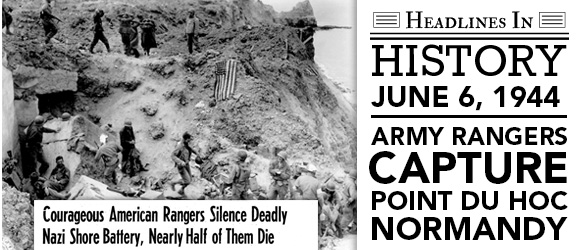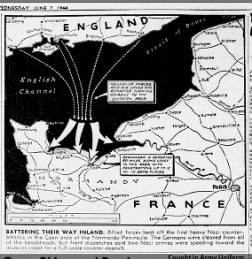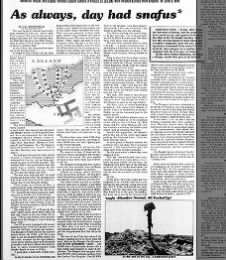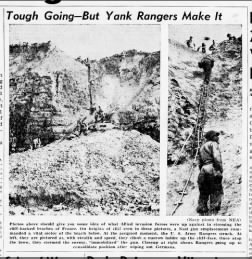

During the Normandy landings of D-Day during World War II, a force of Army Rangers scaled the sheer cliffs of Point-du-Hoc to the west of Omaha Beach and disabled the heavy German artillery there, making them the first American forces to accomplish their mission on D-Day.
In the lead up to D-Day, the Allies were aware of a group of 155mm German cannon positioned on a promontory called Point-du-Hoc, which was located between the planned landing sites of Omaha and Utah beaches. Although the guns could pose a threat to American troops landing on those two beaches, the main worry was the potential damage they could cause to the Allied transport ships offshore during the landings.
With this threat in mind, the Army Rangers were given the mission of disabling the guns at Pointe-du-Hoc early on the morning of D-Day. In preparation, Allied bombers dropped explosives on Pointe-du-Hoc in the months prior to the landings, and the bombings were renewed the morning of D-Day, this time followed by naval bombardment.
Companies D, E, and F of the 2nd Rangers were assigned to ascend the cliffs of Point-du-Hoc, while the remaining Rangers were given other objectives to help with the taking of the promontory. The Rangers faced difficulties the morning of D-Day before they even landed on the beach, which put them about 40 minutes behind schedule.
As Companies D, E, and F neared and then hit the beach, they had to face German fire from above, and the hail of bullets continued as the Rangers attempted with varying levels of success to deploy the equipment necessary to scale the cliffs, including rocket-propelled ropes with grapnels as well as ladders. Each group of Rangers used whatever methods they could to get to the top of the cliff, and once there, they faced the German defenders while trying to find the 155mm guns.

When the Rangers reached the emplacements where the big guns were supposed to be, they found that the guns had been moved and replaced with telegraph poles to fool Allied surveillance. So the Rangers moved on to their next objective of securing a nearby road to prevent German reinforcements from reaching Omaha Beach.
As they worked to achieve this, two groups of rangers discovered the missing guns about a mile from where they were supposed to be and disabled them. This meant the Rangers’ primary objective was achieved by 9 a.m., though their work was far from over, as they were forced to hold Pointe-du-hoc until June 8, when the relief column came to their aid.
Did any of your family members participate in the Normandy landings? Tell us about it! You also can find additional articles about Pointe-du-Hoc and D-Day on Newspapers.com.



My Dad landed at Omaha Beach.
My Dad, too
My dad Chalma D Abbott was a medic and was in the Normandy Landing.
My Dad also
The story I saw about the missing guns is that when they were found, the unit was in formation listening to their leaders sound off. The Rangers crept up on the unprotected guns and popped thermite grenades into them while the unit remained in formation a few dozen meters away.
My wife’s uncle, Hubert “Sharkey” Lamothe, of Fall River, Massachusetts, was a Private First Class with A Company, 1st Battalion 8th Infantry Regiment. His unit was a part of the of the 4th Infantry Division that landed at Utah Beach early in the morning of D day. After overcoming defenses, they moved down the beach causeways to relieve the 101st Airborne Division.
When we visited Normandy a couple of years ago, our guide took us to this area and it is a sight I wish every American could see. What these men did to accomplish their mission was absolutely incredible.
Amen, brother. I saw it all last November, and felt in awe of the courage of the Rangers who did this.
My wife and I were there at 50th. anniv. – quite a sight that brings chills to me to this day .. included the visit at Normandy beach cemetery and the first town liberated – St. Mere Eglise – wonderful, sobering sights .. and the people were wonderful… !
My father, Reuben G Dennard, Jr., was a member of the 2nd Rangers that scaled Pointe-du-hoc. He told me about the guns being moved and that there were heavy casualties (wounded and killed) during the climb as the Germans were shooting down at them from above and throwing rocks and boulders. He and his fellow troops were indeed surprised to find the guns not there but a mile away.
I knew Bud Lomell, who led that group up the cliffs and is credited with exploding the thermetic grenades that blew up those big guns. He often spoke of Rube.
Historian Stephen Ambrose called Lomell and General Eisnehower the two most important Americans in the D Day invasion. The mission those men undertook ensured that the D Day invasion was as much as a success as it was.
My mother’s brother my Uncle Harry Singley, was a captain and doctor Who was killed going to the aid of the wounded soldier in the storming of the beaches
In remembrance – Captain Harry P. Singley of Atlantic County, NJ, 4th Infantry Division, was killed on Utah Beach on June 6, 1944. He is buried at the Normandy American Cemetery and Memorial (D-18-24)
My great-uncle Thomas Thren also landed on Omaha Beach. He was with A Battery of the 225th AAA Searchlight Battalion.
My dad was also a part of the Normandy invasion.
My Dad was also part of the Normandy invasion.
My dad was in the 4th Infantry Division and was one of the many brave soldiers that stormed Utah Beach on Dday.
my dad was also in the 4th. He went in after the initial invasion and ended up in Germany at the Hurtgen Forest where the 4th suffered major casualties. After that the 4th was sent to Luxembourg for r and r and ended up in the Battle of the Bulge where he was wounded and sent home.
My Dad was platoon sergeant for company C 116th infantry that landed on Normandy beach 6 June 1944 and was one of the many wounded.
Two of my high school buddies who should have been graduating that June were killed on the beach when landing. They were James Hughes and Charles Deittrich from Shelby Toole Co MT
Betty
My awesome Dad was an original member of Darby’s Rangers, and involved in this invasion. His devotion to the Rangers lasted past his death…my Mom refused to have his headstone in Arlington National Cemetery made until the administration agreed to have a Ranger banner on his headstone. True story.
I’m with your Mom. The Germans soldiers were terrified of these young Rangers. They called them “…devils in baggy pants…”
Eve Steer
My hat is off to those brave young men who followed their heart-felt instincts in providing military might for the protection of their country in that historic and horrible D-Day invasion in June 1944! I hope that our current aspiring presidential candidates feel the responsibility of assuring the sacrifices of those young men not a act in vain. Each person in uniform who was following military orders during that invasion is a HERO, no matter his rank, his success or failure even getting into the fray, into the water, onto the beach, up the cliff, and to do battle with the enemy! What sacrifices the young men, their families, and their communities paid for these years of freedom we have enjoyed.
Eve
Thank you, we will always owe a debt to all of them.
Jack E Kuhn was among the Rangers who disabled the guns at Pont du Hoc. He later became Chief of the Altoona, PA Police Dept. He was a really nice guy, greatly respected and admired around Altoona. Here’s a link to an article in the Altoona Mirror about the day. http://altoonamirror.com/page/content.detail/id/519716.html
My Uncle Robert Neal, an engineer landed on D-Day plus three. He was from Altoona, Eldorado, PA.
My Dad a forward observers radio operator landed on Utah beach with 4th division, 44th field artillery A battery. Would love to find out what day. I believe the 4th div liberated Paris. He told me he was in battle of Hurtgen Forrest & froze his feet in battle of Bulge! Had his 22 birthday August 4,1944 some where in Europe
My uncle Willem van Stockum piloted a Halifax bomber that completed six Allied missions over France during the days before and after D-Day. His plane was shot down on June 10, 1944 and he is buried in Laval, France. I have visited his grave and the graves of the crew three times–the first time with my parents in 1954 and most recently with my wife Alice in 2014.
My Father, Madison B. Cobb was one of the Rangers that took pointe-du-hoc on D-day. He was part of the 2nd Ranger Infantry Battalion. From what I understand these men were told from the start that this was a suicide mission. He made three trips from the boat to the beach taking supplies with gunfire all around and then heard some one yell that Cobb had been hit. Back on the boat and was in the hospital for a year with the injuries. He carried some of the shrapnel in his arm muscles for all of his life with the pain that went with it. He never forgot his friends that never came back.
All these rememberances about family and friends on June 6, 1944 are inspiring. My favorite place to visit is Normandy, France. A great sacrifice by all that participated.
My uncle Ernest N. Deno was wounded during the invasion of Normandy and received a Purple Heart Medal…..He was transported to a hospital in England where a door was cut into his back to let the blood out. I was born just before he got back home and he came to see me in the hospital…The doctors could not remove the metal near his heart. He told me he was lucky to of had his reading glasses on to protect his eyes….He showed me his purple heart, no French medal…
Where is Uncle Ernie’s French Medal? Uncle Ernie passed away. He was laid up for 15 years with a stroke.
I do not know what happened to his purple heart medal..
richardcdeno@gmail.com
U.S. Navy, combat vet of Vietnam….
I was a chaperone to New Jersey high school students for a visit to Normandy. We were all spellbound by the French tour guide who explained the dauntless courage of those Rangers.
Before the mission, their first commander said that it was a suicide mission and so was relieved of duty.
The Rangers were given just a few hours to take the cannons, or else the battleships would bombard the position.
The rocket propelled ropes with grappling hooks were not designed for the weight of wet ropes and so they didn’t shoot far up the cliffs. The ladders where hard to assemble with shooting from above and besides were too short.
By the time the Rangers took the cliff, their time was up and the bombardment began. They were being shot at by both the Germans and the allied forces.
And the Rangers pressed on.
They found that their purpose to take out the cannons was already done by the Germans a week earlier, as telephone poles were in place as decoys.
The high school students stood in awe at the thought of so much blood and so much effort, so much shelling and firing from both sides, just to find a decoy.
And the Rangers pressed on.
They followed the railroad tracks up the beach to where the huge cannons were stored. THey took them out as was said with thermight bombs, and had to fight more German soldiers.
and the Rangers pressed on.
In the coming day they ran out of ammunition, their renewed supplies sunk in the surf. So they used the captured German guns and ammunition.
As the invasion came in force, the allied forces heard the ranger’s guns and recognized them as German made. So the Rangers had to endure, yet again, the firing by allied forces. Friendly fire, it is called.
The Rangers pressed on.
My Uncle Raymond Marshall Vaughan was also a part of the Normandy invasion. He never talked about it so I can’t add any details except that he made it home.
My wife and I visited Pointe du Hoc last May with a WWll Museum (New Orleans) tour. It is hallowed ground. Recent excavations of a large German Battery nearby at Grandcamp-Maisy raise some questions about the conventional story line, specifically that the guns at PDH had not been moved because they had not been installed yet; the French underground knew and reported this, but Eisenhower sent the Rangers there (with Film Crews attached) anyway because Rommel had filmed himself there while showcasing the unassailable Atlantic Wall. The New Orleans Museum does not advocate this point of view, and it’s to their credit that they include the Maisy site in their tour so visitors can see the infrastructure for themselves and reflect on what it means. The Maisy site curators contend that those guns were not silenced until June 9, and that they inflicted most of the casualties the U.S. suffered at Utah and many of the casualties at Omaha. Their reasoning is that militarily, the Rangers should have attacked Maisy on D-Day instead of Pointe du Hoc, and that the egos of General Officers contributed mightily to the Ranger lives lost in conquering it, and the beachhead losses attributable to the Maisy battery. There were cannons found near Pointe du Hoc but of the type captured in Poland, with little ammo to sustain their firing. The power of the internet is that you can research much of this from your seat, and I encourage you to read about the battery at Grandcamp-Maisy to learn more. Nothing in the Maisy story detracts from the heroism and accomplishments of the Rangers; they just argue that attack there was for political and propaganda purposes more than for military objectives.
Thank you for adding this information. This is just another example of leaders having information that could save lives and instead of using the information in a sane way, they have let their egos set the stage for the media to ennoble themselves.It is a tragedy that during WWII the Allied leaders in their vainglorious pomposity were more interested in their own personal glorification than they were about the lives of soldiers.
On this date 72 years ago, June 6, 1944, US and Allied forces launched the largest air, land and sea invasion in history against Nazi Germany. Today I honor my father, Benjamin Arias Sr. and his comrades who parachuted behind enemy lines landing near Picauville France during the early morning hours. He received the EAME Campaign Medal with 7 Bronze Stars. The Bronze Star was awarded specifically to troops engaged between Dec 6,1941 and Sep 2,1945, in recognition of heroic or meritorious achievement on the field of battle. Cited for campaigns in Normandy, Southern France, Central Europe, Rome-Arno, Rhineland, Northern France and Ardennes. 47th Troop Carrier Squadron, 313th Troop Carrier Group. #MyFatherWarHero #Valor #D-Day #TheGreatestGeneration
Your Father Father was one Helluvaman. Never forget that. God Bless Him.
Does anyone know the best internet source for looking up names to verify their participation in D-Day and after? I have two uncles who served during that period and have been told one was on the second or third day of the D-Day invasion, and one was in the Battle of the Bulge. But I have no details. One uncle had no children so I would especially like to look up his history, as no one has done it. Just wondering best way to begin. (I do have access to ancestry.com.)
My father Donald M Hegdahl was a gunner’s mate (GM2) on board the USS Tuscaloosa, heavy cruiser, off Utah Beach on D-Day and the following days. He and his ship also participated in the invasion of North Africa, Southern France, Iwo Jima, and Okinawa. He enlisted after hearing of the bombing of Pearl Harbor and served throughout the war and until October of 1946. He didn’t talk about the Normandy invasion until near the end of his life, and with the tought of all those billfolds, wrapped to be kept waterproof, floating in the sea surrounding the ship…
What a great tribute to all those that served at Normandy to preserve our freedom. God bless these men.
One of the men who found the German Guns was Len Lomell. His story is fascinating.
http://www.independent.co.uk/news/obituaries/leonard-bud-lomell-us-ranger-who-led-a-successful-attack-on-german-clifftop-machine-guns-during-d-2237426.html
I thank God for such men as these that fought and died for the many freedoms we enjoy in our USA. I thank God I have had the honor of knowing some of these warriors that sacrificed so much for the love of their country.
It has been said that it wasn’t hatred for the enemy in front of them that drove them to fight but the love of their country behind them.
My Dad’s youngest brother, Merle Winston from Brown County, Illinois landed at Omaha Beach on DDay. His unit made their way over the cliffs and into France. Allied bombers missed their German target and bombed his group. Merle died a month later in a British hospital. He is buried close to the flag at the American Cemetery in Normandy. Any information on his unit would be appreciated.
I was a grade school kid at this time, later to be taught by a professor who was blinded during the initial invasion. He never spoke about his experience, even on the phone call I made to him many years later on the June 6 anniversary.
Randall Nelson lost his sight at Normandy, but utilized the GI benefits to complete his education, including the PhD. Remarkable man, and were they all!
.
My uncle Oscar Raymond Stephenson Jr. was a motorman on an LST at the landings of Omaha Beach. My father Norman D. Stephenson was a coxswain mate on LST in the Pacific carrying Marine Rangers to/from raids.
I was born after WW II but had the honour to deliver maple trees to Juno Beach (the Canadian landing area) for the 50th anniversary of D-Day in 1994. It was overwhelming to stand on that ground where so many brave men fought and died. I had family members who fought and flew on that mission with the Canadian forces.
Although I didn’t have a relative directly involved in the invasion, I have a connection… I was a cadet in the Fightin’ Texas Aggie Band, at Texas A&M University, 1965-’69. General James Earl Rudder, CO of the 2nd Rangers, was President of the University at that time.
I visited the site on 22 March ’16.
During the war, my Father worked at the NAA plant near Dallas, producing P-51C, D, and K’s.
My dad was in the 3rd with Auldi Murphy
I am thankful for these stories. My two Uncles served in WWIi, and my dad was a Merchant Marine in WWIi, Korea and Vietnam. I am researching the family history, especially since we were all in a children’s home and didn’t get to know our relatives. But, I can add with pride that history of this great effort is also a part of our family story. Your story has reminded me of our share of this American tale.
My father Lloyd Richard Blume was D12.
My dad, Harley Sampson, was also with the 2nd Ranger Bn on DDay. He never talked about it. I looked at his military records after he died in 2002; he had been awarded 5 Bronze Stars for valor.
My father was with Marine detachment manning anti-aircraft guns on the USS Texas. They were told to gear up to go in and support the Rangers, who were suffering a terrible beating. As they were getting ready–thinking they’d surely be killed because they were trained on the guns, not on hit-the-beaches combat–word came that the Rangers had broken through. He knew the Rangers’ success had saved his life.